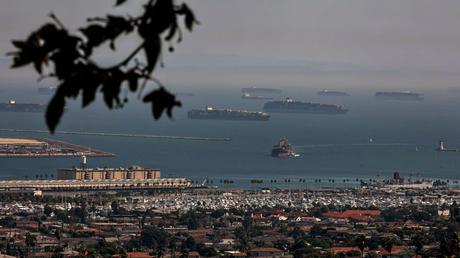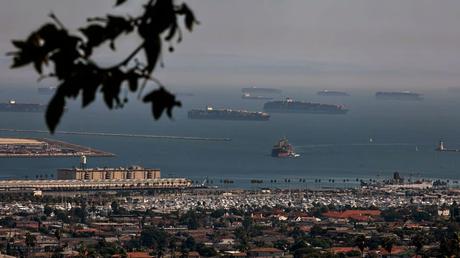The enormous cargo ships that traverse the world's oceans sometimes leave behind "trails": long, wispy clouds that travel across the sky and last for at most a few days before disappearing.
These ghost clouds look beautiful, but they are a visible sign of deadly air pollution. They are formed when tiny sulfur dioxide particles belched from ship smokestacks interact with water vapor in the atmosphere, creating low-lying, highly reflective clouds.
Sulfur pollution from ships causes tens of thousands of premature deaths every year. But in what may seem like a cruel twist - especially from an industry responsible for about 3% of global greenhouse gas emissions - this type of pollution also helps cool the planet by brightening clouds and diverting the sun's energy away from reflect the earth.
So when the International Maritime Organization (IMO), the United Nations body that regulates shipping, cut the allowable sulfur content in marine fuel by 80% in 2020, it was a victory for human health. An estimated 30,000 premature deaths will be avoided each year.
But it was "a silver cloud with a dark edge," said Michael Diamond, an assistant professor at Florida State University's Department of Earth, Ocean and Atmospheric Science. The regulations put an end to a major, accidental geoengineering project. The ship tracks have decreased significantly, and with it the cooling impact of this pollution.
As global temperatures rise, scientists are trying to figure out whether these shipping rules are unintentionally fueling an alarming acceleration of global warming - a controversial hypothesis that has divided some experts.
It's a debate made more urgent by last year's record heat. "Scientists are surprised by the outlier that was 2023," said Olaf Morgenstern, a scientist at the National Institute of Water and Atmospheric Research in New Zealand.
The heat was particularly pronounced in some parts of the oceans, where water temperatures in areas including the North Atlantic Ocean soared off the charts.
The story continues
Scientists say the rise in global temperatures was mainly caused by two factors: the impact of El Niño, a natural climate phenomenon that typically has an impact on global warming, combined with the backdrop of long-term global warming caused by the combustion of fossil fuels.
But some have speculated that the heat was so abnormally high that other influences may also be at play. Theories include a lack of sunlight-reflecting dust from the Sahara, a change in wind patterns and the eruption of the underwater volcano Hunga Tonga in January 2022, which injected enough planet-warming water vapor into the atmosphere to fill 58,000 Olympic-sized swimming pools. .
Of all the theories, however, the impact of shipping regulations is quickly becoming one of the most discussed. Scientists have long known that reducing this particulate pollution would have a warming effect, but to what extent "the controversy begins," Morgenstern said.
In November, prominent climate scientist James Hansen co-authored a paper that argued that reducing shipping pollution was the main cause of an alarming acceleration of global warming beyond what climate models have predicted.
The IMO shipping rules were "an unintentional science experiment," Hansen told CNN. His research predicted that global temperatures would exceed 1.5 degrees Celsius above pre-industrial levels in the 2020s and 2 degrees Celsius in the 2050s - a catastrophic level of warming that could trigger a whole series of climate tipping points.
But other scientists have urged caution, not least because the relationship between pollutant particles and clouds is extremely complex. Unraveling it is "one of the biggest challenges in climate science," Diamond said.
Piers Forster, a professor of climate physics at the University of Leeds in Britain, said reducing shipping pollution was likely to have a very small impact on warming.
According to Forster's calculations, the regulations will increase global warming by about 0.01 degrees Celsius, which could rise to about 0.05 degrees Celsius by 2050 - equivalent to about two years of extra human-made emissions.
However, he added that the uncertain effect of pollution on clouds means there is a possibility that the impact of warming could be much greater: an extra 0.1 or 0.2 degrees by 2050.
Diamond, whose own work estimates that the regulations will produce warming levels of between 0.05 and 0.1 degrees over the next few decades, said this heat won't be a "show stopper" but is important. Every fraction of a degree matters as the world heads toward levels of warming that even humans will find increasingly difficult to adapt to.
Diamond, like most other scientists CNN spoke to, does not believe that the decline in shipping pollution was a major factor in global warming last year, not least because it usually takes some time for changes to occur. in the atmosphere are reflected in climate change. The temperature of the earth.
"But I think it could have made a lot more difference regionally," he said. Shipping is unevenly distributed, with much of it concentrated between Europe, North America and Asia, meaning the impacts of air pollution are also likely to be skewed.
In areas like the North Atlantic, where temperatures rose several degrees above normal in 2023, Diamond said, "shipping is a good explanation for part of why it was so warm."


Only a few years of data are available so far, and it will take some time before scientists can unravel the exact impact of the drop in shipping pollution.
But it is clear that particulate pollution from all sources, including the burning of fossil fuels, has had a cooling effect. Without it, the world would be about 0.4 degrees warmer, according to a 2021 report from the Intergovernmental Panel on Climate Change. And a decrease in pollution in the future could have a major impact.
Annica Ekman, a professor of meteorology at Stockholm University in Sweden, said her research found that a decrease in human-made particulate pollution between 2015 and 2050 could warm the planet as much as 0.5 degrees.
But this isn't an argument against reducing air pollution, Diamond said, it's an argument for tackling air pollution in addition to reducing carbon emissions.
The cooling effects of air pollution are far outweighed by the warming effects of fossil fuel combustion. It's when air pollution is addressed without also reducing carbon emissions that "we could be in trouble," Diamond said.
That's what's happening in this shipping industry, where huge container ships are still propelled across the oceans by hundreds of millions of tons of fossil fuels.
"We need to remember why this ordinance exists," Forster said. "It's there to save lives from air pollution." While reducing this pollution will have a small impact on warming, immediate action to reduce emissions will both slow the pace of global warming and improve air quality, he said. We are not "on a doomed trajectory," he added.
For more CNN news and newsletters, create an account at CNN.com
